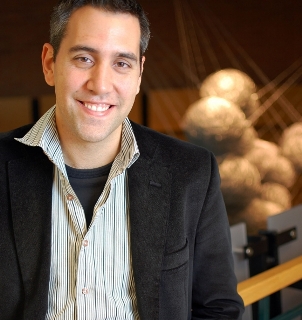Mar 26 2015
A Montana State University astrophysicist who investigates some of the biggest mysteries in the universe has won the world’s most prestigious award for young scientists conducting gravitational research.
 Nico Yunes is the 2015 winner of the Young Scientist Prize administered by the International Union of Pure and Applied Physics through the International Society on General Relativity and Gravitation. (MSU photo by Kelly Gorham).
Nico Yunes is the 2015 winner of the Young Scientist Prize administered by the International Union of Pure and Applied Physics through the International Society on General Relativity and Gravitation. (MSU photo by Kelly Gorham).
Nico Yunes, 34, is the 2015 winner of the Young Scientist Prize administered by the International Union of Pure and Applied Physics through the International Society on General Relativity and Gravitation.
He will receive his IUPAP prize at the next international conference of the International Society on General Relativity and Gravitation. The society, which meets every three years, will gather July 11-15, 2016 in New York City.
“It’s truly a great honor,” Yunes said. “It’s rewarding to know that the work you do is appreciated by people outside of your university and outside of your group by people that you don’t know and you have never met. It says that what you do matters, especially when it comes from people so well-respected in your field.”
Yves Idzerda, head of MSU’s physics department, said, “I feel that this is yet another example of the scientific community recognizing the extremely high quality of research being conducted within the Department of Physics of Montana State University. It is a singular honor for Nico to be selected as the one early-career scientist who has demonstrated the most promise for future discoveries working in the field of gravitation.”
Yunes learned that he had won the prize when he received a call from renowned astrophysicist Gary Horowitz, president of the International Society on General Relativity and Gravitation and head of the Astrophysics, Cosmology and Gravitation section of the National Academy of Sciences. Since Horowitz works at the University of California in Santa Barbara, Yunes thought he might be calling about an upcoming event that Yunes plans to attend at UC’s Kavli Institute for Theoretical Physics.
Instead, Horowitz told Yunes that he had won the IUPAP prize for his “wide-ranging and important contributions to the field of gravitational wave astrophysics.”
The prize – which gives Yunes a medal, certificate and approximately $1,000 -- recognizes outstanding achievements of scientists who are in the early stages of their career. Recipients can work in any area of relativity and gravitation. They must have a maximum of eight years of research experience after earning their doctorate. They are expected to have shown significant achievement and exceptional promise for future achievements in relativity and gravitation.
The first IUPAP prize, given in 2013, went to an astrophysicist at the Massachusetts Institute of Technology (MIT). The second prize, given last year, went to an astrophysicist at Stanford University and Cambridge University.
“Montana State University sits in very good company,” Idzerda said.
Yunes, who grew up in Argentina and earned his Ph.D. in 2008, is an assistant professor of physics at MSU. He researches Einstein’s Theory of General Relativity and gravitation, specializing in black holes, neutrons stars and compact binaries. In 2010, he received NASA’s Einstein Fellowship and the J¨urgen Ehlers Thesis Prize from The International Society on General Relativity and Gravitation. In 2013, Yunes and postdoctoral scholar Kent Yagi published a paper about neutron stars and quarks in the prestigious journal Science.
Yunes has also been invited to address conferences across the United States and elsewhere. Shortly after learning of his IUPAP prize, he flew to Japan as an invited lecturer at Kyoto University. He would speak on experimental tests of relativity. He has also given lectures in Spain, Germany, Canada and France.
Bozeman area residents may recognize Yunes as organizer of the 2013 “Celebrating Einstein” and the 2014 “Rhythms of the Universe: Words and Worlds in Motion.” Both events combined science and the arts to share the story of Einstein and his ideas and the excitement of General Relativity, black holes and gravitational waves. Those events, which brought together a diverse set of leaders, volunteers, artists, educators and scientists, reached 7,000 people in the Gallatin Valley and more than 1,000 K-12 students.
“They (the Bozeman community) will now know the extremely high regard his colleagues hold him in and that he is an individual that more great things will come from in the future,” Idzerda said. “And he is a Bobcat.”
Gravitational waves are produced by violent astrophysical events, such as when stars explode or two black holes collide. Physicists predict that they may be able to detect gravitational waves for the first time in the history of humankind by the end of this decade. They say this feat will test the accuracy of Einstein’s final theory and lead to revolutionary discoveries about regions of the universe that are currently inaccessible with traditional electromagnetic astronomy.
The International Union of Pure and Applied Physics, which currently has about 600 members, is an international non-governmental organization whose mission is to assist in the worldwide development of physics, foster international cooperation in physics and help in the application of physics toward solving problems of concern to humanity. It was established in 1922.
The IUPAP prize is the successor to the Xanthopoulos Award, which was given every three years from 1991 through 2010 to a young relativist.